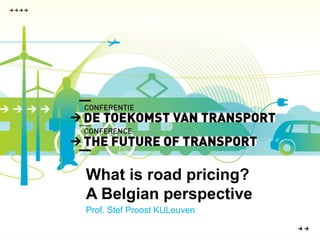
1.2. stef proost
- 1. What is road pricing? A Belgian perspective Prof. Stef Proost KULeuven
- 2. What is road pricing? Charge per km that varies in function of time and place Main idea is to regulate demand for road space by cars and trucks such that the available road capacity is used efficiently – now we rely on too high gasoline and diesel taxes Main benefits are less congestion for the same road space Substitute for extending road capacity Main cost: installation costs and transaction cost
- 3. Misconceptions on road pricing policies 1 Only charge trucks: cars (80%) will quickly take road space made available by trucks Main change in car and truck use is not to switch to other modes but to alter the timing of the trips Road pricing has to make transport “greener” Better to use other instruments (Euro 1, 2, Etc…) Important it to make sure everybody pays and that there is maximal control NO it is more important tolimit transaction costs to some 10% of total revenues
- 4. Misconceptions on road pricing policies 2 Revenues should be spend on extra roads or on public transport No, if roads are needed in presence of road pricing, one needs to extend roads (“good investment policies”) There is not necessarily a need for extra public transport investments as main change is to change timing of trip and as public transport prices are often too low More important is to use revenues on good projects (lower taxes) Road pricing will hurt the poor as much as the rich and this is not fair The main effect on the income distribution runs via the use of the revenues, if one uses the revenues to decrease taxes for lowest income classes, this can have a favourable effect on income distribution
- 5. Road pricing in Belgium To be introduced by Flanders and Wallonia for trucks (2013?) and later cars – coordination with Brussels and Netherlands Main benefit is to help dealingwith road bottlenecks: Antwerp Ring: correct tolling (road pricing) of all existing tunnels allows to postpone Oosterweel for another 10 to 20 years Brussels Ring: Road pricing of Ring (and access into Brussels) will avoid extension of the Ring Discussion among regions: tolling game may lead to too high charges as each region neglects the effects on the other regions In addition: no tank tourism by foreign trucks
- 6. Sources used Calthrop, E., De Borger, B., Proost, S. (2007). Externalities and partial tax reform: Does it make sense to tax road freight (but not passenger) transport?. Journal of regional science, 47(4), 721-752. De Borger, B., Proost, S. (1997), Mobiliteit: De juiste prijs, Garant, Leuven,pp. 312. De Borger, B. , Proost, S. (2001), Reforming transport pricing in the European Union: A modelling approach, Edward Elgar Publishing Limited, Cheltenham , pp. 424 De Borger, B., Proost S. (2009), De Oosterweelverbinding en het ontbrekende alternatief”, Leuvens Economisch Standpunt, 2009/127 http://www.econ.kuleuven.be/eng/ew/les/LES%20127.pdf de Palma A., Proost S., van der Loo S. (2010), “Assessing transport investments - towards a multi-purpose tool”, Transportation Research Part B Methodological, Mayeres, I., Proost, S. (2001). Marginal tax reform, externalities and income distribution. Journal of public economics, 79(2), 343-363. Mayeres I., Proost S., (2004), “Een beter prijsbeleid voor de Belgische transportsector in 15 stellingen”, Leuvens Economisch Standpunt, 2004/106, http://www.econ.kuleuven.be/eng/ew/les/Les106.pdf Proost, S., Van der Loo S., de Palma, A., Lindsey R., (2005), A cost benefit analysis of tunnel investments and tolling alternatives in Antwerp, European Transport/ Transporti Europei n°31, 83-10. Proost S., Dunkerley F., Van der Loo S.,Adler N., Bröcker J., Korzhenevych A.,(2010) ”Do the selected Trans European transport investments pass the Cost Benefit test?”, Discussion Paper CES, DPS10.02 http://www.econ.kuleuven.be/eng/ew/discussionpapers/Dps10/DPS1002.pdf Van der Loo S., Proost S., (2010)-The Oosterweel junction revisited, Discussion Paper CES, DPS10.07 http://www.econ.kuleuven.be/ces/discussionpapers/Dps10/DPS1007.pdf .